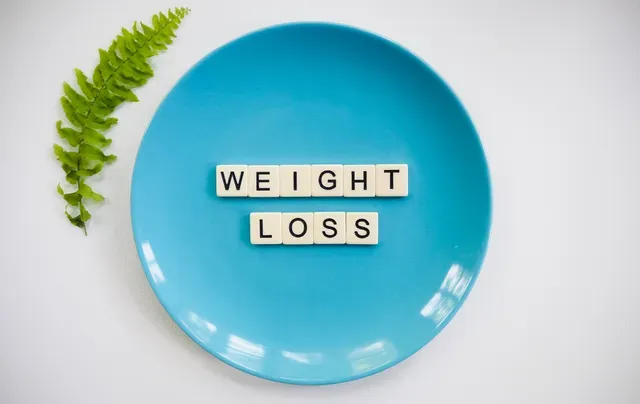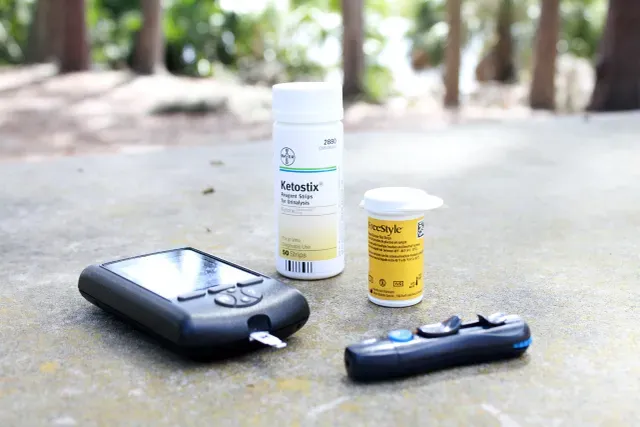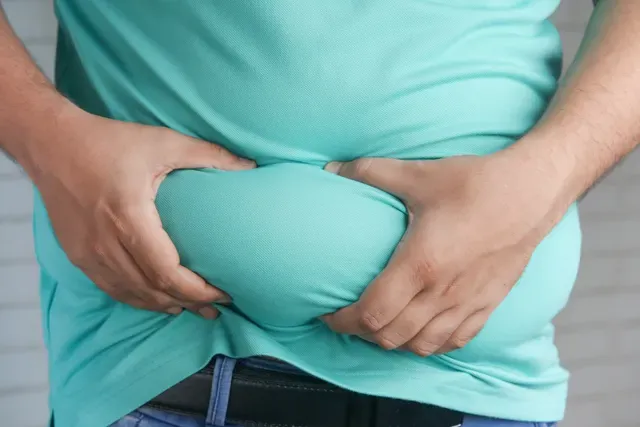Intermittent fasting is a good strategy for many reasons and combined with keto it can help you lose weight even faster.

Intermittent fasting is a good strategy for many reasons and combined with keto it can help you lose weight even faster.
Wouldn't it be great to lose weight faster and easier than ever before? Well, two popular weight loss strategies promise just that - combined keto diet and intermittent fasting.
What are the benefits of combining these two approaches? And is it possible to stick with this combined keto diet and intermittent fasting diet strategy long-term? To find out all the answers to these weight loss questions, read on!

What is intermittent fasting?
Intermittent fasting is a weight loss strategy that has been gaining traction in recent years. It involves fasting for intervals, typically between 12 and 16 hours.
The goal of intermittent fasting is to help you lose weight by restricting your caloric intake.
You can do intermittent fasting with either a traditional or keto diet, with a healthy lifestyle and routine, intermittent fasting can be an effective way to lose weight faster but what are the benefits of intermittent fasting? Here are four of them:
1. Intermittent fasting helps to reduce insulin resistance and improve blood sugar control.
2. It can help you lose weight by reducing your intake of calories, promoting ketosis, and improving fat loss.
3. It has been shown to be an effective weight loss strategy for people with obesity or type 2 diabetes because it helps them manage their blood sugar levels better.
4. Intermittent fasting is a good way to improve your health overall by helping you maintain a healthy weight, maintaining muscle mass, and reducing your risk of chronic diseases such as heart disease and cancer.

How does intermittent fasting work?
There's a lot of weight loss advice out there, but what works for one person might not work for another. That's why it's important to try different weight loss strategies to find the one that's right for you.
One weight loss strategy that's popular these days is intermittent fasting. It's a good strategy because it helps you lose weight by intermittent cutting down on caloric intake.
When combined with keto, this type of diet can help speed up the body's fat burning process. You don't have to do extreme restrictions when following an intermittent fasting and keto diet plan - just moderate your eating habits overall.
In the long run, both strategies are likely to lead to permanent weight loss, especially if followed for a longer period of time!
So, if you're looking for a weight loss strategy that's both effective and healthy, intermittent fasting is a great option to consider.
The appetite control is the body's way to control hunger and satiety. When you eat less or when you make your appetite smaller, it will satisfy your appetite automatically. The key words here are "understand" and "slow down."
Intermittent Fasting Benefits
There's a reason intermittent fasting is becoming so popular - it has a lot of benefits! Not only does it help you burn calories more efficiently, but it also has other benefits like improved mental health and reduced inflammation.
Combined with keto, intermittent fasting can help you lose weight even faster. If you're interested in trying this strategy, be sure to consult with your doctor first.
There's a lot of information out there on intermittent fasting, and it's important to choose the right approach for you.
Whichever intermittent fasting strategy you choose, be sure to stick with it and see the weight loss benefits for yourself!
Why Electrolyte & minerals are important when you do Fasting
One of the benefits of intermittent fasting is that it helps you lose weight more quickly.
One way to speed up the body's fat burning process is by supplying your body with enough electrolytes and minerals.
When you fast, your blood sugar levels drop and this can lead to an imbalance in mineral levels in your blood.
This can impact both heart health and weight loss, so it's important to make sure you're getting enough electrolytes and minerals when fasting.

Is intermittent fasting safe?
It's a healthy way to lose weight that is also sustainable. You can do it with or without keto - either way works fine. What's more, intermittent fasting can help you burn calories more quickly than normal eating patterns.
And that's not all - intermittent fasting can also help you maintain your muscle mass. So, if you're looking for a weight loss strategy that is both healthy and effective, intermittent fasting could be a great option for you!
Are there any side effects of intermittent fasting?
There are a few potential side effects to consider when doing intermittent fasting, but they're all minor. The most common side effect is feeling tired or weak in the morning - this's because blood sugar levels drop during fasting.
You might also experience hunger pangs and cravings, especially if you hadn't eaten for a while before starting your fast. However, these symptoms usually fade after a few hours and don't last long overall. Finally, make sure you drink plenty of water throughout your fast - dehydration can cause some unpleasant side effects like.
Should Women Fast?
There isn’t a definitive answer to this question as fasting can vary based on an individual’s health condition and lifestyle. Some people may choose to fast for health benefits, while others may do so for religious or spiritual reasons.
Ultimately, it is up to each person whether they believe fasting is beneficial for their body, however, fasting is considered safe for most people, except for pregnant women and those who are breastfeeding.
If you’re unsure if fasting is right for you, talk to your health care provider or consult a nutritionist/ dietitian.
How does the keto diet work?
The ketogenic diet is a high-fat, low-carbohydrate eating plan that was first developed in the 1920s to treat epilepsy. It’s now been shown to have many benefits for weight loss and overall health, including reducing inflammation and improving blood sugar control.
Intermittent fasting and keto high-fat diet may be the perfect fit for you. Both diets have several benefits, including lower body weight and reduction of inflammation.

How do they work? Let's take a look.
While intermittent fasting helps to slow down the digestion process, keto helps to control blood sugar levels with little hunger and without counting calories, it’s a great option.
This helps you lose weight by reducing calorie intake without having to worry about starving.
In addition, keto is a good diet for those who want to improve their cognitive function, as it has been shown to improve insulin resistance and blood sugar levels.
So, if you're looking for a fat loss strategy that is effective and healthy, intermittent fasting and keto may be the perfect fit for you.
Nutrition and health benefits of ketogenic diet
It’s been shown to have many benefits for fat loss and overall health, including reducing inflammation and improving blood sugar control. Here are four more reasons why you should consider following a keto diet:
1. It Can Help You Lose Weight
A study published in the journal Nutrition found that people who followed a keto diet lost more weight than those on any other type of calorie-restricted
diet. In fact, the keto diet was found to be more effective than both low-fat and high-carb weight loss diets in terms of long-term weight loss.
2. It Can Help You Lower Your Risk of Heart Disease
Studies suggest that people who follow a keto diet may have a lower risk of heart disease or stroke. This is due to the way that keto’s high fat intake can help you lose weight and reduce your blood pressure levels. Additionally, research has shown that ketogenic diets may improve cholesterol health overall by helping you reduce bad cholesterol levels and increase good cholesterol.
3. It Can Help You CONTROL Your Blood Sugar Levels, lose weight, Feel More energetic and Have a Clean Glucose Level.
Keto is a low carb diet plan which has been proven to help people control blood sugar levels, lose weight, feel more energetic and have a clean glucose level. When you follow a keto diet plan your body converts stored fat into energy instead of carbs which helps in losing weight. Moreover, keto also helps in managing blood pressure as well since it reduces insulin resistance.
4. It Has Fewer Side Effects Than Other Diets
A keto diet is less likely to cause weight loss side effects such as heart disease, high blood pressure, type 2 diabetes, and cholesterol problems.
In fact, many people find that keto is more effective at helping them lose weight and maintain their health than other popular weight loss programs.
How to get into ketosis
There is no single step-by-step guide that will get you into ketosis immediately - it can take some time to achieve this state of ketosis.
However, there are several ways that you can start reducing carb intake and increase your intake of healthy fats to get into ketosis quickly.
Here are a few tips:
1. Start by eliminating all carbs from your diet and replacing them with healthy fats. This will help you fast track the process of becoming fat-adapted and keto-ready.
2. Make sure that you're drinking plenty of water throughout
Your fast - dehydration can cause some unpleasant side effects like constipation, and headaches.
3. Track your ketones using a blood ketone monitor to ensure that you're in ketosis.
4. Avoid night-time eating as this will increase your carb intake and slow down the process of becoming fat-adapted and keto-ready.
The keto flu & side effects
The keto flu is a term that has been used to describe the symptoms of carb withdrawal - including muscle pain, irritability, and headache. While these side effects are typically mild and short-lived, they can be uncomfortable. If you experience any of these symptoms while on keto, it's important to take them easy for a few days until your body adjusts. Additionally, make sure that you're drinking plenty of water throughout your fast - dehydration can cause some unpleasant side effects like constipation, and headaches. Finally, seek advice from a health professional if you experience any severe side effects during.

LDL & HDLcholesterol on keto
- What’s the difference?
LDL cholesterol is "bad" cholesterol, meaning it's high-density lipoprotein (HDL) that is good. HDL cholesterol plays a vital role in helping to prevent heart disease by removing harmful fat and plaque from your arteries.
- How does keto affect LDL and HDL cholesterol?
When you’re on keto, your body starts to use fat as its main source of energy. This changes how your metabolism works and it also results in the loss of some bad cholesterol - like low-density lipoprotein (LDL) - while high-density lipoprotein (HDL) levels increase. Therefore, eating a diet high in healthy fats can help to improve heart health by boosting both LDL and HDL cholesterol levels.
What can you eat on keto?
A ketogenic diet is high-fat, low-carbohydrate and can be used to treat a variety of health conditions. There are several types of foods that you can eat on keto - including healthy fats, protein and vegetables. It's important to note that while the diet is high in fat, it's also low in calories so you'll need to make sure that you're eating enough food to ensure that you're getting the nutrients your body needs. Additionally, while keto is a great weight loss diet, it's important to be mindful of the types of food that you're eating and make sure that you're sticking to the recommended macros.
Keto macros: Carbs, protein, & fat
On keto, you should aim to consume around 10% of your calories from carbs, 20% of your calories from protein and 70% of your calories from fat in grams on a strict diet you say no more than 20-gram carbohydrates a day.
Additionally, it's important to make sure that the type of carbs that you're eating are healthy - opting for low carb foods like leafy greens and berries instead of processed snacks or sugary beverages is a great way to stick to keto macros. Finally, it's important to note that keto isn't just a weight loss diet - you should make sure to include healthy fats in your diet for health benefits like improved heart health and brain function.

Keto results — how can it benefit you?
Not only is it healthy for you, but keto can also help you lose weight quickly. Here are three benefits of keto:
1. Intermittent fasting is a fantastic way to improve your health and reduce your risk of diseases.
2. It can help you lose weight by reducing cravings and increasing energy levels.
3. Keto also helps you maintain muscle tissue, which is important for keeping your body toned and healthy and if you're looking to speed up weight loss, keto is an excellent strategy to use!
Potential risks of a keto diet
There's no doubt that keto is a great weight loss strategy. But it's important to be aware of the potential risks before you start. One of these is the keto diet itself - which can be high in fat and low in carbs, which can be dangerous. Additionally, intermittent fasting may not work as well if you're also on a keto diet, meaning you could end up losing more weight than necessary. It's important to talk to your doctor before starting either of these weight loss strategies to make sure everything is safe for you. In the meantime, keep things low-carb and keto-friendly by sticking to healthy, nutritious foods and snacks that will help you stay on track.
Frequently Asked Questions:
What is the best keto diet?
When it comes to keto, there's no one-size-fits-all approach. That's why it's important that you find a keto plan that fits your unique lifestyle and dietary restrictions. There are many different types of keto plans, but they all have similar goals. These include helping you lose weight and improve your health by reducing inflammation, improving insulin sensitivity, and boosting metabolic rate. When combined with intermittent fasting, keto can help you burn more calories faster than on a regular diet. Therefore, make sure to exercise regularly while on the keto diet to achieve the best results!
How do you know if your diet fits into a ketogenic diet?
First and foremost, if you are following a ketogenic diet for weight loss, you will need to be tracking your carb intake. All foods high in carbohydrates should be avoided on the keto diet. Secondly, if you experience blood sugar spikes and crashes after consuming food then it's likely that your diet isn't fitting into a ketogenic style of eating. Lastly, people who follow a keto diet typically eat high-fat low-carbohydrate meals with plenty of healthy protein along with intermittent fasting to help regulate their body's insulin levels. To simplify the process, urine strips are used to check ketone production. Ketosis is a state of having enough stored fat in your liver that the body can burn this fat instead of glucose (carbohydrates). This will lead to Ketosis urine test results: elevated levels flush out rapidly when you fasted or ate too much and get more accurate over time as it gets better at detecting false positive results. Urine testing has drawbacks such as intermittent inaccuracy due to diet changes but also lack.
How does eating a low carb or keto diet help with fat loss and diabetes management?
Eating a low carb or keto diet can help weight loss and diabetes management in a few separate ways. For one, intermittent fasting helps metabolize fat and reduce the amount of calories you consume. This is because when you fast, your body taps into its stored fat for energy- instead of glucose. As a result, you’ll start losing weight more easily since you’re consuming fewer calories overall. Additionally, a keto diet reduces your blood sugar levels by creating a state of ketosis- which causes your body to burn stored body fat for energy instead of glucose. As a result, your blood sugar levels are controlled more effectively- which may help you manage diabetes better in the long term. It lowers the insulin level and mean less strain on kidney stones. Keto diet is also known to reduce intake of sugar and carbs which helps in avoiding kidney stones as well as high blood pressure levels too. Combined intermittent fasting and keto can help you lose weight faster as well. By reducing calorie intake at least Zone-style, while also engaging in intermittent fasting- you’re helping to train your body to burn more calories overall. This method is often called the “fat-burning ketogenic diet” and has been shown to be highly effective in weight loss.

Is there any difference between paleo, primal, and keto diets?
There is no real difference between paleo, primal, and keto diets- they are all low-carbohydrate and focus on sustainable, healthy foods. Each diet has its own benefits that should be considered before making a decision. Primal diet followers often find that they have easier time digesting food and tend to feel fuller longer than those on a Paleo diet. Primal dieters also often see faster weight loss results as they avoid dairy, grains, legumes, and processed food. Keto dieters are often health-conscious and looking for ways to lose weight fast. This diet restricts intake of all types of sugar including added carbs, which can help assist in weight loss. Another benefit of keto is that it allows people to eat normally during the morning and evening without affecting blood sugar levels or crashing later on. Intermittent fasting is a great strategy for people who want to lose weight quickly because it allows them to eat normally during the morning and evening without altering their blood sugar levels.
What is the difference between the Atkins diet & Keto?
The Atkins diet is a low-carbohydrate diet and more protein. It was originally developed in the early 1970s by Dr. Robert C. Atkins to help people lose weight and improve their health. Keto is a more restrictive diet that restricts intake of all types of sugar including added carbs- and this can help weight loss. Keto advocates for high-fat, low-carbohydrate nutrition and believes that ketosis (a state in which the body burns fat rather than glucose for energy) helps to burn calories more efficiently. The keto diet is similar but uses a different approach than the Atkins diet: it focuses on getting more healthy fat and low carbs to burn fat for energy.
Is it possible to get too much fat in my body if I'm eating a low carb or Keto proof diet?
Yes, it is possible to get too much fat in your body if you're eating a low carb or keto proof diet. This happens because when you restrict your carbohydrates and calories, the body begins to burn more stored fats instead. While you are not getting enough Omega 3s on a keto or low carb diet, your intake of important fatty acids (EFAs) will be lowered, this can lead to weight loss resistance and heart disease. Therefore, it is important to supplement with fatty acids on keto or low-carb diet, especially if you are not getting enough Omega-3s. EFAs help increase fat burning, which in turn will help maintain weight loss and reduce the risk of heart disease.
Can I drink coffee while following a low carb/keto lifestyle?
Yes, you can drink coffee while following a low carb/keto lifestyle, as long as you understand that the ketogenic diet and intermittent fasting work best when balanced together. When you are on a keto diet, your body enters a state of ketosis, which is where your body uses fat for energy instead of glucose. In ketosis, your body also produces ketones, which are metabolic by-products that give you significant benefits like weight loss. Coffee is a great source of caffeine, which can help you stay energized throughout the day while on a low carb or keto diet. Additionally, coffee also contains antioxidants that may support weight loss and health overall.

Are there any other supplements or foods that you recommend for people who follow this kind of diet plan?
Yes, when following an intermittent fasting and keto diet, you'll want to make sure that you're getting enough healthy fats. Some useful sources of healthy fats include avocado, nuts, seeds, and quality olive oil.
Additionally, you may like to take supplements such as Chromium or magnesium for better blood sugar control when following an IF/keto diet plan.
Here are four more reasons why you should consider following a keto diet:
1. It Can Help You Lose Weight
A study published in the journal Nutrition found that people who followed a keto diet lost more weight than those on any other type of calorie-restricted
diet. In fact, the keto diet was found to be more effective than both low-fat and high-carb weight loss diets in terms of long-term weight loss.
2. It Can Help You Lower Your Risk of Heart Disease
Studies suggest that people who follow a keto diet may have a lower risk of heart disease or stroke. This is likely due to the way that keto’s high fat intake can help you lose weight and reduce your blood pressure levels. Additionally, research has shown that ketogenic diets may improve cholesterol health overall by helping you reduce bad cholesterol levels and increase good cholesterol.
3. It Can Help You CONTROL Your Blood Sugar Levels
It can lower your blood sugar levels, lose weight, Feel More energetic and Have a Clean Glucose Level.
Keto is a low carb diet plan which has been proven to help people control blood sugar levels, lose weight, feel more energetic and have a clean glucose level. When you follow keto diet plan your body converts stored fat into energy instead of carbs which helps in losing weight, moreover, keto also helps in managing blood pressure as well since it reduces insulin resistance.
4. It Has Fewer Side Effects Than Other Diets
A keto diet is less likely to cause weight loss side effects such as heart disease, high blood pressure, type 2 diabetes and cholesterol problems. In fact, many people find that keto is more effective at helping them lose weight and maintain their health than other popular weight loss programs.
Conclusion:
When it comes to keto, the conclusion is that it’s a diet plan that can help you lose weight and improve your health. While there are some challenges to implementing the keto diet, overall research suggests that this type of eating plan is effective for weight loss and disease prevention.
Disclaimer:
This blog is intended to provide general information to readers. It should not be construed as medical advice, nor should it replace the expertise of a trained professional. The author is not responsible for any adverse effects that may occur from following these suggestions.


